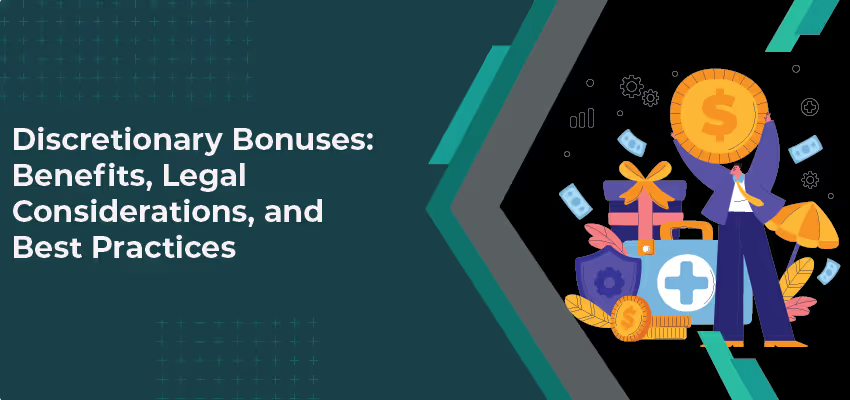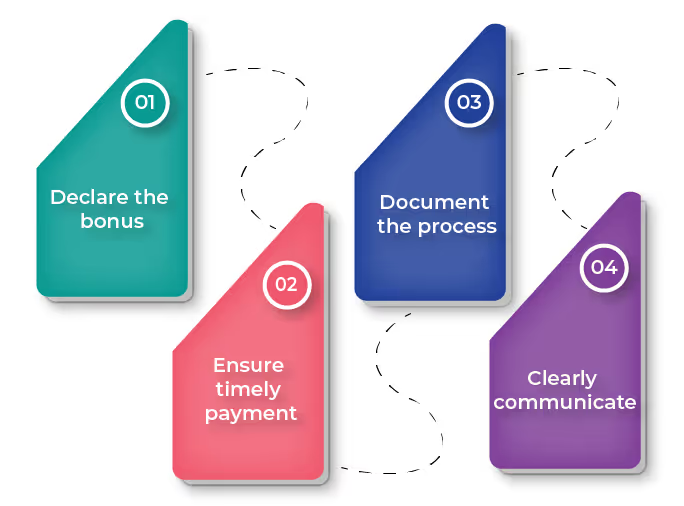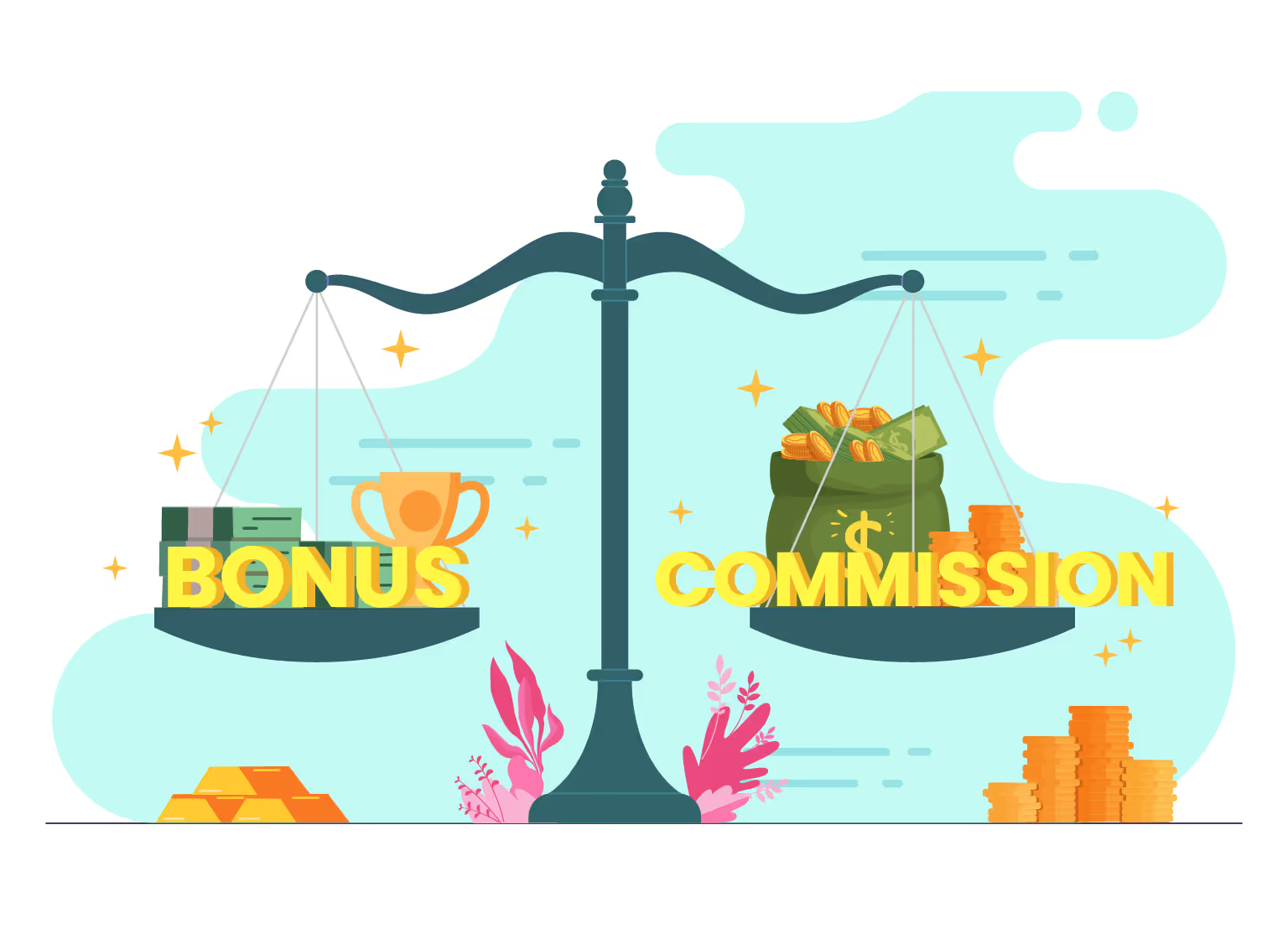
Blog
Discretionary Bonuses: Benefits, Legal Considerations, and Best Practices
July 24, 2024


Key Insights
One day your manager came to you out of the blue, gave you a pat on the shoulder, and said you did a good job.
Well such a scenario for most of us is cloud nine.
Then, think about the situation where they give you a bonus for your “good job!”
If there is a level called Cloud Ten, you would be beyond that!
These unexpected, untimely recognitions and rewards are sure to have a huge positive impact on a good employee.
By good employee, I don't mean the high performers alone. They might also be your average performer but who is disciplined, committed, dedicated, and loyal.
This bonus a manager gives you based on their decision and choice is called a discretionary bonus.
In this blog, we will walk you through everything about this bonus, from its meaning to the difference between non-discretionary bonuses and its different types of incentive pay.
We will look into how to create a discretionary bonus plan, its implementation process and even the legal and ethical part about it.
So don’t waste much time and let's scroll down.
What Is a Discretionary Bonus?
Bonus that employees receive at the employer's subjective wish or discretion is called a discretionary bonus.
There are no predefined criteria or milestone achievements to be met to receive this bonus. It is simply your employer’s judgment to recognize the employee or as a gesture of goodwill.
It is usually received when the employee is least expecting such a reward. The irregular timings and unanticipated receiving make the discretionary bonus all the more endearing.
Difference between Discretionary and Non-Discretionary Bonus
Discretionary and non-discretionary bonuses are poles apart in their criteria, timings, purpose, and many more.
Discretionary Bonus
A discretionary bonus has no predefined criteria and solely falls on the employer's decision. It rewards an employee’s performance, loyalty, or goodwill at a time when they least expect such recognition.
As it solely is the employer’s decision, discretionary bonus plans are not documented and vary depending on the employee or situation.
Non-discretionary Bonus
A non-discretionary bonus is your typical incentive bonus that is strictly laidown in the contract. It follows a set criteria for eligibility, and a scheduled timing of payment and has the purpose of enhancing employee motivation and performance.
Employees what they need to achieve to receive the bonus and expect a fixed amount at a specific period of the year.
These distinctions help in understanding how each bonus can be utilized to its best use within the organization.
What are the different types of discretionary bonuses to choose from?
Some employees take the extra mile. They are ready to put in some extra hours, take up some extra tasks without any complaint, and just see the company as their own.
These employees deserve that extra recognition for their selfless dedication and loyalty.
Here are a few discretionary bonus examples for employers to reward those star employees and recognize their dedication and hard work:

Performance bonuses: To recognize the selfless dedication to go beyond the normal duties.
Spot bonuses: Awarded spontaneously to recognize an exceptional employee or their performance.
Holiday bonuses: Awarded around the holiday season as a gesture of goodwill.
Retention bonuses: Given to key employees to stay with the company during the company’s critical period or transitions.
Referral bonuses: Rewards an employee who refers to a candidate who later gets hired and proves their grit.
Attendance bonuses: Awarded to employees who maintain exemplary attendance records.
Customer Service bonuses: Given to employees who go above and beyond in their customer interactions to provide outstanding customer service.
These examples might not be for your typical high-performing employees.
At times, discretionary compensation recognizes and rewards those employees who do more than expected all because that is what they are and that is how they like to get it done.
In doing so, they enhance your overall work culture, brand identity, and business operations.
How to create a discretionary bonus plan?
The decision to award discretionary bonuses rests solely with the employer. It is their sudden and spontaneous decision.
This means it's inherently flexible.
For this reason, most often discretionary bonuses don’t actually have a plan.
Though it's not strictly necessary to create a formal roadmap on how to go about with your discretionary incentive plan, having one is always an advantage.
So here are a few tips to create an effective discretionary bonus plan

Allocate a separate budget
Discretionary bonus needs a separate allocation so that it doesn’t tamper with the more structured incentive program. This ensures that employers have the opportunity to reward deserving employees without any financial strain.
Document the expense
Discretionary bonus is not a clearly documented expense as it solely is the employer's decision to pay a lump sum amount to the employee. However, keep track of how the money allocated for discretionary bonuses is utilized.
Ensure that the right candidate receives it
Sometimes employers can make the wrong judgment or can be biased. This leads to certain employees receiving rewards while the deserving ones remain hidden in the cloud of favoritism.
Monitor its fairness and judicious use
Proper tracking of the utilization of the budget and the recognition of the right employee is required. Only such strict monitoring can ensure the purpose of discretionary bonuses is met.
Even when a tool has no structured way, building your own structure and system will be useful to ensure that the purpose for which it was actually meant is fulfilled.
How to implement discretionary bonuses for employees?
Discretionary bonus is an employer's recognition of what they consider to be your achievement.
It solely rests on them the amount you will receive and the time of payment.
However, to make the implementation of discretionary bonuses effective a step-by-step process will be useful.

First, declare the bonus. Managers must clearly communicate the bonus decision, the amount, and the specific achievement for the reward.
Second, ensure timely payment. Companies must make timely and prompt payments at the next payroll cycle to honor the employee’s commitment.
Third, document the process. To maintain transparency of the discretionary bonus, record the details of the bonus decision and payment.
Fourth, clearly communicate. Inform employees about the particulars of the bonuses and how it works though it's a subjective surprise.
Following these steps in your implementation will enhance the effectiveness of discretionary compensation.
It makes the reward valuable to the employee and helps the rest of the team understand its significance.
Why do employers give discretionary bonuses?
All employees like to be recognized for the work we do.
Sometimes they are not the smartest in the room, they might not be the best performer or even the top achiever.
At times, they are the average employee who is punctual at the office, disciplined about their tasks, and a good team player who enhances the work culture.
Employers must strike a balance between acknowledging the efforts of their high-performing employees and not overlooking the efforts of others.
It is for this reason and more that most employers make the best use of discretionary bonuses.
- A simple gesture of gratitude
- Enhance motivation
- Improve engagement and morale
- Foster a positive work culture
- Increase employee retention
- Boost company performance
The perks of acknowledging your employees go a long way.
It can positively impact your employees, operations, and company.
What are the legal and ethical considerations to take for a discretionary bonus?
Discretionary bonus is a subjective and flexible incentive.
An individual decides if an employee deserves recognition and reward based on their personal judgment.
Since it is based on personal decisions there needs a legal and ethical check to prevent any discrimination or violation.
From a legal point of view, companies must ensure that these discretionary bonuses comply with anti-discriminatory laws.
There needs to be a check that no individual receives extra payment based on any bias. That there is no discrimination based on race, gender, religion, caste, disability, or any other factor.
In addition, companies must ensure these bonuses are reported under the respective tax laws.
By adhering to these legalities, companies also demonstrate their ethical standpoint in their incentive structure.
That their discretionary decisions are fair, transparent, and devoid of any favoritism. By making objective decisions in a subjective incentive program, companies also prove their integrity, values, and corporate culture.
The innate subjectivity of discretionary bonuses puts a legal and ethical bind on companies to be extra cautious of their decisions.
Best practices for implementing discretionary bonuses
It is repeatedly emphasized throughout this blog that discretionary bonuses are subjective, that a single person takes the decision etc etc.
And yes, it has a lot of perks for your employees. It improves their engagement, motivation, retention etc etc.
But here is a thing! If you don't include some checks and trials, other employees might feel left out, start doubting the program is biased, and have the opposite effect than what was intended.
So here are a few best practices to help you hit the target right:
- Provide clear reasons for giving the particular employee the bonus.
- The bonus should be declared publicly in front of the team.
- Create a fair and transparent process for the overall discretion bonus plan.
- Distribute the promised bonus with the next payroll itself.
- Collect feedback from HR and peers about the effectiveness of the bonus.
Building a cross-and-check process even to a subjective incentive as discretionary compensation will only enhance its effectiveness.
Following these best practices will help you enjoy the perks of discretionary bonuses without falling into the pitfalls of mismanagement and unfair distribution.
Final Thoughts
What makes some managers or employers stand out in the crowd is their leadership skills.
They appreciate the potential of their teammates, give credit for their efforts, and reward them timely.
For such managers, discretionary plans are a great boon. For they do not have to wait for the incentive program schedule, performance metrics analysis or any such things to reward their teammates.
They make use of their discretionary bonus budget to give the most deserving employee recognition.
Just like any other incentive reward, the discretionary bonus also fulfills similar purposes.
Employee motivation, enhanced performance, increased engagement, loyalty, and retention.
However, knowing that it was your employer’s personal decision to choose you for this bonus makes it all the more special. Like a hand-picked candidate for a special occasion.
Despite these feel-good aspects of discretionary bonuses, care must be taken not to succumb to any bias or favoritism. Such a scenario can ruin the overall purpose of the compensation.
To read more about effective compensation programs, visit https://www.kennect.io/.
To know how automation enhances your effective compensation programs, Book A Demo with US.
ReKennect : Stay ahead of the curve!
Subscribe to our bi-weekly newsletter packed with latest trends and insights on incentives.
Thank you! Your submission has been received!
Oops! Something went wrong while submitting the form.
Your data is in safe hands. Check out our Privacy policy for more info















